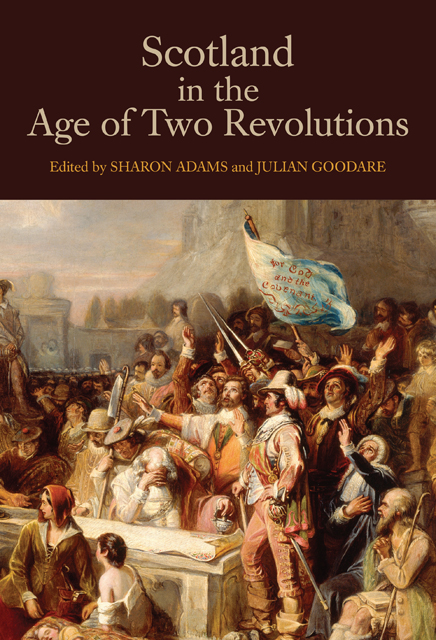Book contents
- Frontmatter
- Dedication
- Contents
- Figures and Tables
- List of Contributors
- Preface
- List of Abbreviations
- 1 Scotland and its Seventeenth-Century Revolutions
- 2 The Middle Shires Divided: Tensions at the Heart of Anglo-Scottish Union
- 3 The Western Highlands and Isles and Central Government, 1616–1645
- 4 The Scottish Bishops in Government, 1625–1638
- 5 The Scottish Revolution
- 6 In Search of the Scottish Republic
- 7 Highland Lawlessness and the Cromwellian Regime
- 8 The Worcester Veterans and the Restoration Regime in Scotland
- 9 The Political Thought of the Restoration Covenanters
- 10 Scottish State Oaths and the Revolution of 1688–1690
- 11 The Tribulations of Everyday Government in Williamite Scotland
- 12 The Company of Scotland and Scottish Politics, 1696–1701
- Chronology of Seventeenth-Century Scotland
- Further Reading
- Index
- Studies in Early Modern Cultural, Political and Social History
5 - The Scottish Revolution
Published online by Cambridge University Press: 28 February 2023
- Frontmatter
- Dedication
- Contents
- Figures and Tables
- List of Contributors
- Preface
- List of Abbreviations
- 1 Scotland and its Seventeenth-Century Revolutions
- 2 The Middle Shires Divided: Tensions at the Heart of Anglo-Scottish Union
- 3 The Western Highlands and Isles and Central Government, 1616–1645
- 4 The Scottish Bishops in Government, 1625–1638
- 5 The Scottish Revolution
- 6 In Search of the Scottish Republic
- 7 Highland Lawlessness and the Cromwellian Regime
- 8 The Worcester Veterans and the Restoration Regime in Scotland
- 9 The Political Thought of the Restoration Covenanters
- 10 Scottish State Oaths and the Revolution of 1688–1690
- 11 The Tribulations of Everyday Government in Williamite Scotland
- 12 The Company of Scotland and Scottish Politics, 1696–1701
- Chronology of Seventeenth-Century Scotland
- Further Reading
- Index
- Studies in Early Modern Cultural, Political and Social History
Summary
’Tis he that’s cloathed with light, and dwels in thunder,
Displayes this gratious Year, great Year of wonder:
A yeare, which shall unto all nations be
A common talk, This our felicitie
Shall be the measure of their souls desire,
And patterne of their wishes, when th’aspire
At such joy, peace, harmonie, and blesse
As this Great year of our Great Covenant is
In which are opened the eyes of Nations all.…
For after yeares from hence shall date their tyme
In Almanackes, and in our historie
This year of joy gold letters shall descry.
To understand seventeenth-century Scotland it is essential to understand the revolution that occurred in the middle years of the century. That revolution casts long shadows backwards and forwards through the period, with some of its origins readily detectable at the beginning of the century and even before, and with its effects working their way through the whole of the rest of it. As early as 1596, the attempted coup d’état of that year has distinct parallels with the events of 1637–38. As late as 1707, there could have been no union of parliaments with England if the revolution had not secured parliament’s place in the Scottish constitution. As the example of the union illustrates, the importance of the revolution extends into many other fields of history beyond the narrative histoire événementielle – fiscal history, religious history and the history of political thought are some other examples.
The term ‘Scottish Revolution’ was launched by David Stevenson in a celebrated book of 1973. It was inspired by English historians’ recent adoption of the term ‘English Revolution’. Previously there had been occasional mention of the ‘Presbyterian Revolution’, evidently on the model of the earlier English ‘Puritan Revolution’. These new terms drew attention to the wide-ranging character of the revolutionary transformation: it was not just about religion, but also about political and social change. However, although these terms have been generally accepted, not all scholars who have used them have reflected explicitly on their meaning. Hence this chapter.
This is not another retelling of the story of the revolution. Initially at least, it is an exercise in definition of terms. To understand the Scottish Revolution it is essential to understand what revolution is – or at least what revolution was in early modern Europe.
- Type
- Chapter
- Information
- Scotland in the Age of Two Revolutions , pp. 79 - 96Publisher: Boydell & BrewerPrint publication year: 2014



